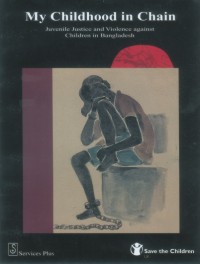Law book review
Childhood
in chain
Mahbubul
Islam
Oli
Md. Abdullah Chowdhury
Our
Childhood in Chain
Pages 34
Published by Service Plus
Supported by Save the Children UK
House 9 Road 16 Gulshan
Dhaka 1212
Service
Plus has published the book, entitled, "My Childhood
in Chain" with the support of Save the Children UK.
Although Bangladesh is one of the earliest signatories
of UN Convention on the Rights of the Child (UNCRC) and
we have theoretically a good piece of legislation like
Children Act 1974, children in conflict with law have
to undergo through an inhumane process. "No child
shall be deprived of his or her liberty unlawfully or
arbitrarily. The arrest, detention or imprisonment of
a child shall be in conformity with the law and shall
be used only as a measure of last resort and for the shortest
appropriate period of time" said eloquently in Article
37 of UNCRC and it was reflected in Children Act 1974
as well. The reality is completely different, nevertheless.
 The
book focuses on juvenile justice and violence against
children in Bangladesh. Imong others, Af{an Chowdhury,
an eminent journalist has contributed in the book and
he was in the editorial board too. Other members of the
editorial boards are Dr. Mizanur Rahman, G. Nayeem Wahra
and Advocate U M Habibun nessa.
The
book focuses on juvenile justice and violence against
children in Bangladesh. Imong others, Af{an Chowdhury,
an eminent journalist has contributed in the book and
he was in the editorial board too. Other members of the
editorial boards are Dr. Mizanur Rahman, G. Nayeem Wahra
and Advocate U M Habibun nessa.
There
are five chapters in the book:
*Preface
*Children in confinement
*Is confinement the only solution
*Violence against children:2003
*Progress till date
There
is a sharp criticism of The Vagrancy Act 1943 as the law
was originally passed at a time when the colonial rulers
were trying to grapple with a self-made problem of famine.
Again, the term "corrmction" used for children
is vehemently opposed as internment of children is for
rehabilitation and the term correction is not used in
the Children Act 1974.
The
idea of confinement of children has been bluntly rejected
in the book as the state, the sole responsible body to
protect the children of the nation, has been detached
from the reality. It has been observed in the book, "Once
children appear in court and are sentenced to a formal
disposal, mainly c}stody, they begin to see themselves
as criminal{ and are much more likely to continue to behave
in a similar manner in their la{t years". The book
also suggest{ possible way o}t. Community in~olvement
would be a better solu|ion to deal with this problem.
If properly staffed and funded, community based programmes
that ould rehabilita|e children who ire in contact with
law, would be less expensive, more humane, more protective
of public safety than others and most importantly as effective
as a punitive system. A number of options have been suggested
in this chapter, nonetheless.
Fourth
chapter comes up with statistics on violence against children
in Bangladesh. Around 2513 incilents of torture and violence
agiinst children were reported in 2003. According to this
information, it can be seen that children of all ages
ha~e been exposed to violence. Another important aspect
is that nes of raping of joys is rare in our society
and in the present data, there are no such cases. However,
boy children do become victims of such incident as the
book rightfully observed. The total number of detained
children in jail as on December 2003 was 1063. Out of
them, the numbers of boys were 961 and girls were 102.
On the other hand, a total 240 children are being kept
in Kishore Unnyan Kendra while 30 of them are girls.
There
has been a list of progresses at the end of the book.
It comprises of the important decisions and proposals
taken at the Prime Minister's Office for the benefit of
the children in police custody, jail or other places.
One of the major decisions is that a taskforce to expedite
the release of children in jails will be constituted in
district and thana levels. The inter-ministerial committee
headed by the Principal Secretary of Prime Minister's
Office will, as the National Taskforce, supervise the
activities of district committees and review the progress
in implementation of the decisions made by the national
taskforce. Moreover, designated juvenile court with sessions
power will be set up in every district of Bingladesh.
However, such 11 deci{ions have been mentioned in the
book.